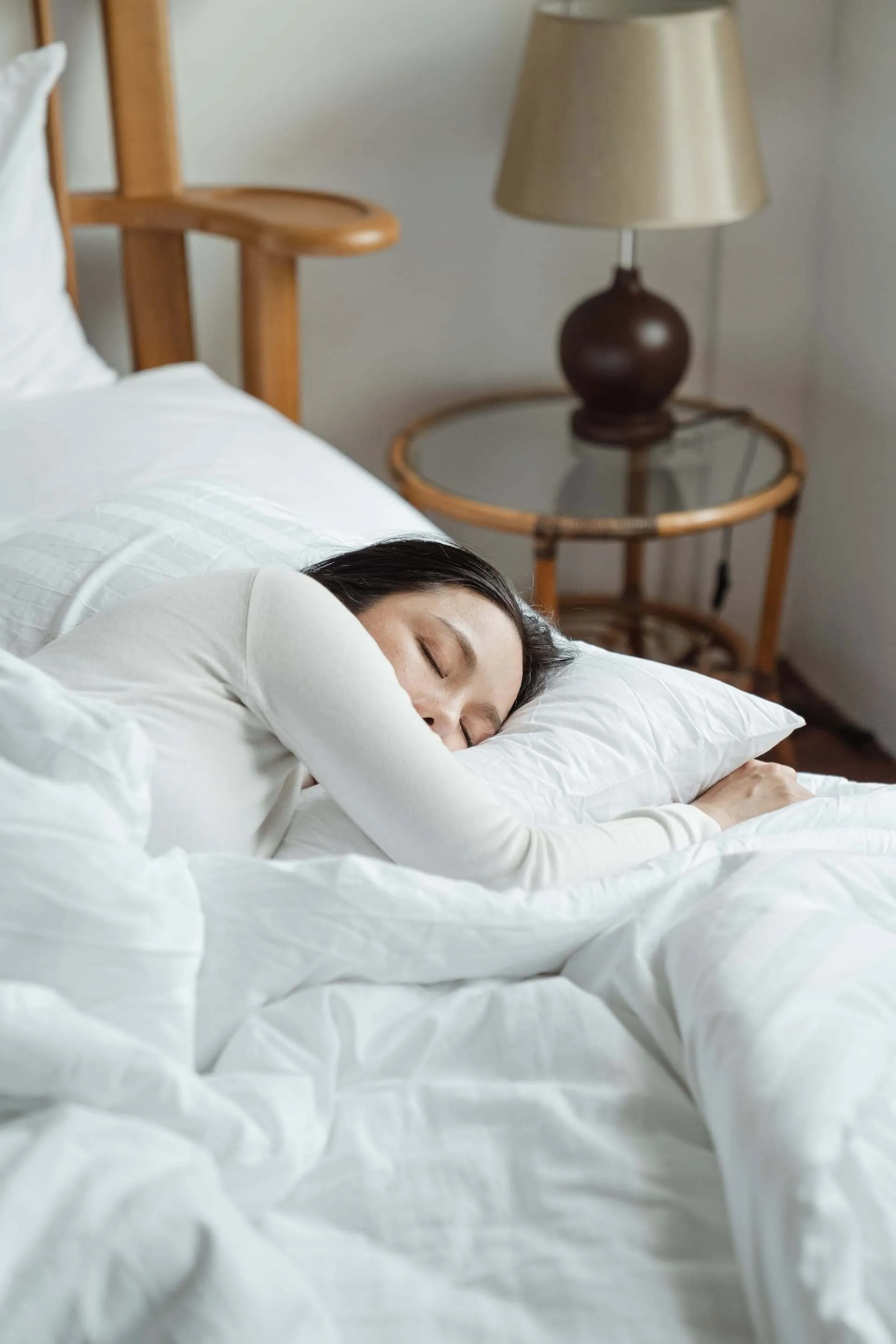Our overall health relies on many factors, but some say adequate sleep is the real MVP. While we sleep, our bodies are hard at work maintaining healthy brain function and supporting physical health. Research shows a connection between sleep quality and how we think, learn, react, and even get along with others.
Still, many of us can’t seem to get the zzzs we need. The CDC reports that only about two-thirds of US adults are getting enough sleep¹. For some, a hectic work schedule is to blame. For others, it’s difficult to turn off their thoughts (looking at you, anxiety.) And still, for some, there’s just not enough time in the day to get it all done.
But falling short of our sleep needs can have some alarming consequences, even outside drowsiness and fatigue. For example, people who don’t get enough sleep may have a higher risk of heart disease, high blood pressure, stroke, obesity, and a weakened immune system. Poor sleep can also disrupt your hormones, including leptin and ghrelin, which control hunger². It can lead to a decreased ability to respond to insulin and even affect your food choices throughout the day.³
So what can we do to set ourselves up for success at bedtime? As it turns out, a good night’s sleep can be influenced by what we eat during the day. In this article, we’ll discuss the relationship between sleep and nutrition and review eight of the best foods to help you sleep.
What is The Relationship Between Sleep and Nutrition?
There’s no denying that nutrition and sleep play a critical role in our overall health. However, sometimes we overlook the connection between the two. The food we eat can significantly influence our sleep systems, ultimately affecting our circadian rhythm and sleep cycle.
While nutrition needs are very individualized, there are vital nutrients we can focus on to help contribute to a good night’s sleep. Proper nutrition considers macronutrients (carbohydrates, protein, and fat), vitamins, and minerals, to ensure you meet your needs through a variety of food sources.
Generally speaking, a diet rich in fruits, vegetables, lean protein, whole grains, and healthy fats can check all the boxes when it comes to eating for sleep (and many other aspects of health). However, digging a little deeper, research points to the importance of low glycemic index (GI) foods, omega-3 fatty acids, certain amino acids, melatonin, and select vitamins that help you sleep, such as:
- Vitamin D
- Vitamin C
- Vitamin B6
- Magnesium
It's impossible to design one perfect diet for better sleep quality since nutritional factors vary based on the individual’s metabolic and digestive capabilities. Sleep and nutrition are complex, involving many interconnected systems within the body. So, keep that in mind as you implement changes into your routine.
Eight Foods That Will Enhance Your Sleep Quality
Everything we eat affects our sleep hygiene, but let’s focus on eight of the best foods for improving sleep time and efficiency. Below we’ll look at a few low-GI foods that can positively contribute to sleep quality and break down everything you need to know to maximize their benefits.
1. Almonds
Though the exact amount can vary, almonds are a source of the hormone melatonin, which helps to regulate the sleeping and waking cycle. Melatonin, combined with other essential nutrients found in almonds (like magnesium, calcium, and zinc), can help you get more restful sleep at night.
Since almonds are rich in healthy fats and low in sugar, they have a low GI score, making them a nutritious late-night snack choice. A one-ounce serving of raw almonds provides 77 milligrams of magnesium and 76 mg of calcium, two nutrients that have been shown to play a role in our sleep cycles.⁴,⁵
2. Turkey
Turkey is a source of tryptophan, making it a good choice to support quality sleep. While there’s still room for continued research regarding turkey’s effects on sleep, its high protein content and low GI score indicate that including a serving at dinner or as a bedtime snack may be beneficial.
3. Kiwi
It may be surprising to some, but recent research shows a connection between kiwifruit and improved sleep quality. A small study that required adults with self-reported sleep disorders to eat two kiwifruits approximately one hour before their bedtime found that the bedtime snack resulted in improved total sleep time and sleep efficiency.⁶
Kiwifruit has a GI score of 47, and one kiwi contains many sleep-promoting compounds, including 12 mg of magnesium, 24 mg of calcium, 215 mg of potassium, and 17 micrograms of folate.⁷

4. Fatty fish
Research has shown that an increased intake of fatty fish, such as salmon and mackerel, can help improve overall sleep quality.⁸ They are rich in omega-3 fatty acids and vitamin D, which are critical for regulating serotonin. Serotonin is a vital component in establishing the sleep and wake cycle.
Fatty fish also contain other nutrients that are beneficial to sleep wellness. For example, a three-ounce serving of wild Atlantic salmon contains 25 mg of magnesium, 10 mg of calcium, and 21 mcg of folate.⁹ And since it contains an insignificant amount of carbohydrates, it doesn’t have a GI score and can be an excellent addition to a low-GI dinner before bed.
5. Walnuts
Walnuts are a source of melatonin and magnesium, which help support sleep hygiene. In addition, the fatty acids found in walnuts also help produce the sleep-enhancing chemical serotonin.
A 100 g serving of walnuts provides 142 mg of magnesium and 424 mg of potassium in addition to healthy fat.¹⁰ They have a low GI score of 15, making them a nutritious late-night snack if you are hungry before bed.
6. Tart cherries
Tart cherries are rich in four essential compounds that support sleep regulation: melatonin, serotonin, tryptophan, and potassium. A 2018 review on the health benefits of cherries found a positive connection between sleep health and cherry consumption.¹¹
Tart cherries have a low GI score of 22, making them a good bedtime snack. However, because they are rich in fiber, vitamin E, and vitamin C, they can also be beneficial during other times of the day.
7. Banana with nut butter
Bananas, especially those slightly under-ripe, have a low GI score. Pair it with a serving of nut butter, and you’re adding a helping of healthy fats that will keep you full and digest easily as you sleep. Bananas are a source of tryptophan and potassium, and the added peanut butter gives your snack a boost of magnesium to help your body relax into sleep.
8. Low-fat cottage cheese
The low-fat cottage cheese serves as a good source of protein, and it contains tryptophan, which is needed for the production of serotonin. In addition, it has a low GI score, making it an ideal snack before bed (or any time of the day!). Pair with some whole-grain crackers to include a serving of carbs, and your hunger will be satisfied before climbing into bed.
{{mid-cta}}
Three Drinks That Help You Sleep
While planning your menu with bedtime in mind, you might also consider your beverages. Your drink of choice can significantly affect your sleep quality and even help you navigate certain sleep disorders.
Tart cherry juice
Tart cherry juice may be worth trying if you struggle with falling asleep at night. Among its many potential health benefits is its ability to improve sleep quality. Tart cherry juice contains impressive amounts of antioxidants, potassium, and melatonin, and it has a low GI score of 43.
One cup of tart cherry juice contains 433 mg of potassium and is rich in antioxidants like anthocyanins and flavonols. This nutrient-rich beverage may help promote better sleep quality by fighting oxidative stress and inflammation.¹² A 2018 small study found that participants who drank eight ounces of cherry juice twice daily for two weeks reported longer sleep time and improved sleep quality compared to when they didn’t drink the juice.¹³
Chamomile tea
A warm cup of herbal tea is as soothing as it sounds. Caffeine-free beverages such as chamomile tea before bedtime can help you prepare for quality sleep. Chamomile contains apigenin, an antioxidant that may help promote sleep and reduce insomnia.¹⁴ You might even mix in some warm milk to add amino acids and calcium to your late-night tea.
Malted milk
Malted milk has been a longtime go-to for many people with trouble falling asleep. It combines milk with a specially formulated powder containing wheat flour, malted barley, and malted wheat, along with sugar and vitamins.
Just one cup of the low-GI, caffeine-free beverage provides 310 mg of calcium and 485 mg of potassium.¹⁵ It also contains folate, zinc, and B vitamins, creating a mixture of nutrients that support sound sleep.
Foods and Drinks You Should Avoid Before Sleep
While specific bedtime snacks can help you sleep, some foods and beverages work against restful sleep. So, which foods hinder your ability to sleep? Let’s review some common culprits.
Fried Foods
As delicious as those mozzarella sticks sound for a late-night snack, fried foods take a long time to digest and can cause acid reflux if eaten too close to bedtime. If you enjoy fried foods, consider eating them earlier in the day to avoid late-night heartburn.
High-Sodium Foods
High-sodium foods can cause you to wake in the middle of the night, parched and desperate for a glass of water. Avoid disrupting your sleep cycle by limiting or avoiding high-sodium foods before bedtime.
Coffee
This one is pretty common knowledge, but still an important reminder. The caffeine content in coffee acts as a stimulant, directly working against your body’s sleep processes. Avoid coffee, energy drinks, black tea, and other caffeinated beverages right before bedtime.

A Few Dietary Tips For Improved Sleep
In addition to choosing foods that support a good night’s sleep, there are a few other dietary habits you can put into place to get your best zzz’s. Among these other things to help you sleep, the following steal the spotlight:
Build a balanced diet
A well-balanced diet is essential to our overall health and sleep patterns. Include nutrient-rich foods (and supplements as appropriate) throughout your day, and be mindful of the timing of your meals. At night, limit foods that will spike your blood sugar levels to avoid a rush of energy before bedtime and crashing while you sleep.
Limit caffeine
Caffeine is a stimulant found in foods like dark chocolate and beverages such as coffee, energy drinks, soft drinks, and tea. Caffeine can make it hard for you to fall asleep and disrupt your circadian rhythm. One study found that consuming caffeine six hours before bedtime can reduce your overall sleep time.¹⁶
Limit alcohol
While alcohol may make you drowsy at first, it can actually disrupt your sleep cycles. It has been affiliated with insomnia and circadian rhythm abnormalities, so if you plan to consume alcohol, do so in moderation and try to leave a few hours in between your last drink and bedtime.¹⁷
Limit (too) late food consumption
Try to time your meals and snacks with enough time to finish digesting before bedtime to avoid acid reflux or heartburn. You may also want to be especially cautious with fatty and spicy foods late in the evening.
Nutrition plays a critical role in our overall health, and our food choices can support our sleep wellness as much as the best mattress money can buy. Understanding how to maximize your nutrition to serve your body best can be a game changer for sleep and all things wellness. If you have questions about sleep and nutrition and how to design your healthy lifestyle, come check out the Signos blog. In the meantime, sweet dreams!
Topics discussed in this article:
References
- Centers for Disease Control and Prevention. (2022, September 7). Sleep and sleep disorders. Centers for Disease Control and Prevention. Retrieved November 26, 2022, from https://www.cdc.gov/sleep/index.html
- U.S. Department of Health and Human Services. (2022, March 24). Why is sleep important? National Heart Lung and Blood Institute. Retrieved December 26, 2022, from https://www.nhlbi.nih.gov/health/sleep/why-sleep-important#:~:text=During%20sleep%2C%20your%20body%20is,long-term)%20health%20problems.
- Centers for Disease Control and Prevention. (2022, July 28). 10 surprising things that can spike your blood sugar. Centers for Disease Control and Prevention. Retrieved November 25, 2022, from https://www.cdc.gov/diabetes/library/spotlights/blood-sugar.html
- Fooddata Central Search Results: Nuts, almonds. FoodData Central. (2019, April 1). Retrieved November 26, 2022, from https://fdc.nal.usda.gov/fdc-app.html#/food-details/170567/nutrients
- Jeon, S., Yu, S., Kim, C., Lee, H. J., Yoon, Y., & Kim, T. (2022). Lower Serum Calcium Levels Associated with Disrupted Sleep and Rest–Activity Rhythm in Shift Workers. Nutrients, 14(15). https://doi.org/10.3390/nu14153021
- St-Onge, P., Mikic, A., & Pietrolungo, C. E. (2016). Effects of Diet on Sleep Quality. Advances in Nutrition, 7(5), 938-949. https://doi.org/10.3945/an.116.012336
- Fooddata Central Search Results: Kiwifruit, green, raw. FoodData Central. (2019, April 1). Retrieved November 26, 2022, https://fdc.nal.usda.gov/fdc-app.html#/food-details/168153/nutrients
- Del Brutto, O. H., Mera, R. M., Ha, J. E., Gillman, J., Zambrano, M., & Castillo, P. R. (2016). Dietary fish intake and sleep quality: a population-based study. Sleep medicine, 17, 126–128. https://doi.org/10.1016/j.sleep.2015.09.021
- Fooddata Central Search Results: Fish, salmon, Atlantic, wild, raw. FoodData Central. (2019, April 1). Retrieved November 26, 2022,https://fdc.nal.usda.gov/fdc-app.html#/food-details/173686/nutrients
- Fooddata Central Search Results: Nuts, walnuts, English, halves, raw. FoodData Central. (2022, October 28). Retrieved November 26, 2022, https://fdc.nal.usda.gov/fdc-app.html#/food-details/2346394/nutrients
- Kelley, D. S., Adkins, Y., & Laugero, K. D. (2018). A Review of the Health Benefits of Cherries. Nutrients, 10(3). https://doi.org/10.3390/nu10030368
- Chai, S. C., Davis, K., Zhang, Z., Zha, L., & Kirschner, K. F. (2019). Effects of Tart Cherry Juice on Biomarkers of Inflammation and Oxidative Stress in Older Adults. Nutrients, 11(2). https://doi.org/10.3390/nu11020228
- Losso, J. N., Finley, J. W., Karki, N., Liu, A. G., Pan, W., Prudente, A., Tipton, R., Yu, Y., & Greenway, F. L. (2018). Pilot Study of Tart Cherry Juice for the Treatment of Insomnia and Investigation of Mechanisms. American journal of therapeutics, 25(2), e194. https://doi.org/10.1097/MJT.0000000000000584
- Salehi, B., Venditti, A., Sharifi-Rad, M., Kręgiel, D., Sharifi-Rad, J., Durazzo, A., Lucarini, M., Santini, A., Souto, E. B., Novellino, E., Antolak, H., Azzini, E., Setzer, W. N., & Martins, N. (2019). The Therapeutic Potential of Apigenin. International Journal of Molecular Sciences, 20(6). https://doi.org/10.3390/ijms20061305
- Fooddata Central Search Results: Beverages, Malted drink mix, natural, powder, prepared with whole milk. FoodData Central. (2019, April 1). Retrieved November 26, 2022, https://fdc.nal.usda.gov/fdc-app.html#/food-details/173221/nutrients
- Drake, C., Roehrs, T., Shambroom, J., & Roth, T. (2013, November 15). Caffeine effects on sleep taken 0, 3, or 6 hours before going to bed. Journal of Clinical Sleep Medicine. Retrieved November 26, 2022, from https://jcsm.aasm.org/doi/10.5664/jcsm.3170
- He, S., Hasler, B. P., & Chakravorty, S. (2019). Alcohol and Sleep-Related Problems. Current opinion in psychology, 30, 117. https://doi.org/10.1016/j.copsyc.2019.03.007




.svg)




.webp)
.webp)




.svg)
.svg)
.svg)
.svg)
.svg)
.svg)
.svg)
